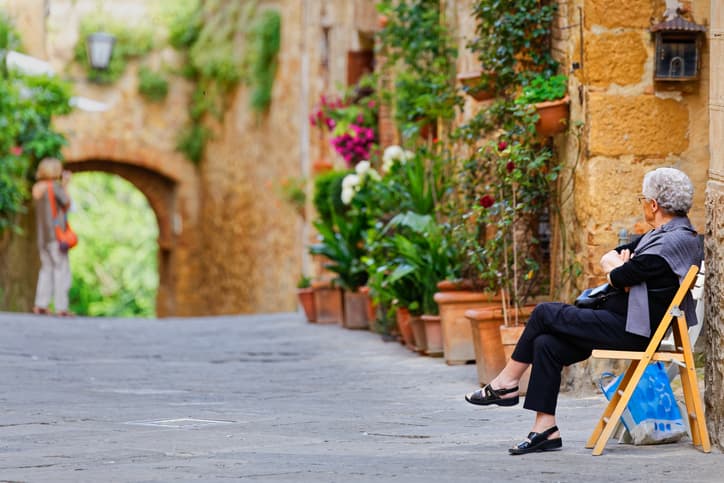x
Our website uses cookies. By continuing to use the site, you agree to our use of these cookies. To learn more about how we use the cookies and how you can manage them, please see our cookies policy.
Italy is renowned for its rich culture, stunning landscapes, and favorable climate. It's no surprise many individuals choose to spend their retirement years in this enticing country. However, retiring in Italy does require some preparation and understanding of certain conditions. If you are a UK citizen, there are additional steps to take when retiring in Italy post-Brexit. Fortunately, Giambrone & Partners’ English-speaking Italian Avvocati (lawyer) that can help.
This guide will take you through the necessary stages and requirements for retiring in Italy, obtaining a visa appropriate to your circumstances, the impact of Brexit on retiring in Italy, and potential disadvantages to consider.
Click on the links below to jump to that section:
Discover more about the various requirements you need to adhere to when retiring in Italy
Here’s how you can acquire an elective residency visa
Find out how Brexit can affect your chances of successfully retiring in Italy
Consider the potential downsides of choosing to live in Italy
Here’s how our English speaking Italian Avvocati can help
Retiring in Italy necessitates several steps to be taken. First, you must demonstrate that you have sufficient financial resources to support yourself without working. You must be able to prove an income of at least €31,000 per annum for a single person, and €38,000 for a couple.
Secondly, proof of medical insurance coverage is essential. This can either be private health insurance or you can sign up for the Italian National Health Service (SSN) if you’re an EU citizen (European Union). Non-EU citizens will require private health insurance.
You also need to demonstrate that you have a place of residence throughout your retirement, either by buying a house or having a rental contract.
Most importantly, anyone wishing to retire in Italy must obtain an elective residency visa from the Italian Consulate. To find out more about retiring in Italy, you can visit our advice centre.

An elective residency visa allows non-EU retirees to live in Italy. This long-term retirement visa application process typically begins in your country of residence or origin.
The application requirements include: proof of income (as mentioned above), proof of health insurance and a rental agreement or property deed. These documents are usually presented to the Italian Consulate in your home country.
Upon approval, you have six months to enter Italy, after which you must apply for a Permit of Stay (Permesso di Soggiorno) within eight days of arrival. This is a requirement for non-EU citizens to reside in Italy for more than 90 days. This process includes fingerprinting and additional verification, after which, if approved, your residence permit will be valid for a year and can be renewed annually. Other visas for anyone seeking permanent residency include the Italian Golden Visa and Italian long-stay visa.
If you need any assistance when retiring in Italy, our Italian Avvocati can help. We can guide you through the process of applying for an elective residency visa, as well as gather the necessary documents needed as a retiree to retire in Italy.
After Brexit, British citizens are no longer EU citizens, so they must apply for a long-term visa if they wish to retire in Italy. The Elective Residency Visa mentioned earlier is an option.
For Britons already residing in Italy before the end of 2020, they can apply for a new Biometric Residence Card which maintains their rights under the Withdrawal Agreement. It's important to note that the UK state pension can be claimed in Italy, and it will be upgraded annually.
You can find out more about retiring in Italy as a British citizen by reading our previous guide.

While Italy has many attractions for retirees, there can be a few disadvantages to consider. Language can be a barrier if you do not speak Italian. While English is widely spoken in tourist areas, it's less common in rural regions. It might be necessary to learn basic Italian to manage daily tasks.
The Italian bureaucracy is known to be complex and time-consuming, which can be daunting for retirees, especially when dealing with matters such as tax, health services, and residency permits.
Cost of living, especially in the popular regions like Tuscany and the Amalfi Coast, can be high. Also, depending on the type of visa and your income, you may need to pay Italian taxes, which can be higher than in other countries.
Lastly, healthcare quality can be variable. While cities have excellent healthcare, rural areas may lack in quality and accessibility.
How Giambrone and Partners Can Assist
Retiring in Italy is an appealing prospect for many, but it's important to research thoroughly and understand the requirements and potential downsides before making a decision. Knowing what to expect will help you prepare and enjoy your golden years in this charming country.
It is also worth consulting an Italian lawyer (Avvocato) to assist you when choosing to retire in Italy. An Italian Avvocato can communicate with the Italian consulate on your behalf, ensuring you submit all of the correct documents and fill out the correct paperwork to start your life in Italy.
To find out more, or to start the process, get in touch with Giambrone & Partners Italian Avvocati today.
Related content
Retiring to Italy When You Have Dual Citizenship
Links Used for Reasearch